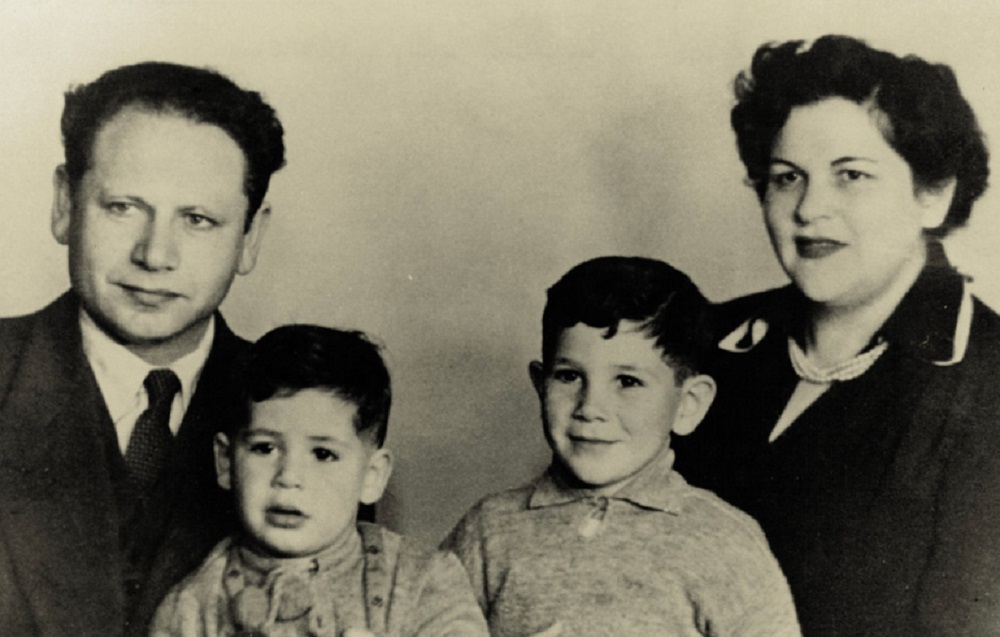Ben-Zion Netanyahu: The Father of Israel’s Hardline Policies and His Influence on Benjamin Netanyahu
Exploring the Radical Ideologies of Ben-Zion Netanyahu and Their Lasting Impact on Israeli Politics and the Arab-Israeli Conflict.

Watan-Ben-Zion Netanyahu was not just a name in the history of the Israeli Prime Minister’s family, but a figure who carried within him a century filled with ideas and positions as extreme and provocative as those of his son’s current policies.
It appears that these ideas, shaped by a life of confrontations with the Arab world, clearly influenced Benjamin Netanyahu’s direction, contributing to his sharp stances toward the Palestinians, which are reflected in his actions and words to this day.
So, what do we know about Ben-Zion Netanyahu? How did he influence the Zionist movement? And why was his view of Arabs always so hostile?
Ben-Zion… A Biography
Ben-Zion Mikhelkovski (later known as Netanyahu, meaning “Gift of God”) was born in 1910 in Warsaw, the capital of Poland, during its partition and under the control of the Russian Empire.
His father, Nathan Mikhelkovski, a writer and Zionist activist from Belarus, held the position of Rabbi and traveled across Europe and the United States delivering speeches in support of the Zionist movement he deeply believed in.
In 1920, Nathan decided to immigrate to Palestine with his family as part of the major wave of Jewish immigration. After moving between Jaffa, Tel Aviv, and Safed, the family eventually settled in Jerusalem, where Ben-Zion enrolled in the David Yellin Teachers’ Institute and the Hebrew University of Jerusalem.
It was common among Zionist immigrants at the time to adopt Hebrew names, so Nathan Mikhelkovski began signing some of his articles under the name “Netanyahu,” the Hebrew version of his first name, which his son adopted as the family name.
In 1944, Ben-Zion Netanyahu married Tsila Segal, who his son, Prime Minister Benjamin Netanyahu, would later describe as “the center of our family and its ultimate authority.”

Ben-Zion Netanyahu’s Influence on Zionism
Ben-Zion studied medieval history at the Hebrew University of Jerusalem, and during his studies, he became involved in the “Revisionist Zionist Movement,” a faction that split from the mainstream Zionism of the time, believing the mainstream movement was too conciliatory toward the British authorities ruling Palestine.
Led by Ze’ev Jabotinsky, the Revisionists advocated for a more militant Jewish nationalism, in contrast to the left-wing Labor Zionism that led Israel in its early years. They believed that Israel’s borders should encompass all of historic Palestine and Jordan.
Ben-Zion was deeply influenced by Jabotinsky’s views. He served as a co-editor of the Hebrew journal Betar from 1933-1934 and later became editor-in-chief of the Ha-Yarden daily Revisionist Zionist newspaper in Jerusalem (1934-1935) until it was shut down by British mandate authorities. He later worked as Jabotinsky’s secretary in New York, where he helped rally American support for Jabotinsky’s militant Zionist movement.
Ben-Zion Netanyahu’s Radical Views on Arabs
Ben-Zion Netanyahu firmly believed in the idea of “Greater Israel” and was vehemently opposed to any territorial or local concessions. When the United Nations proposed the partition plan for Palestine in 1947, he was one of the signatories of a petition rejecting the plan. During this period, he was politically active in Washington, lobbying U.S. congressmen to support his hardline Zionist views.
After returning to Israel in 1949, Ben-Zion attempted to enter political life but failed due to the dominance of the mainstream Zionist movement, led by David Ben-Gurion, which viewed groups like the Stern Gang and Revisionists as threats to the newly established state.
Although he continued his academic career, Ben-Zion’s views remained extreme, including his belief that Arabs inside Israel would choose the extermination of the Jews if given the chance. This view led him to advocate for the forced expulsion of Arabs from Palestine, a position he held until the end of his life.
In 2009, Ben-Zion Netanyahu openly declared his views on the Arab-Israeli conflict, stating, “The tendency toward conflict is at the heart of Arab thought. They are enemies by nature, their personality does not allow for concessions, and regardless of the resistance or the cost, their presence means perpetual war.”

Many analysts have speculated that these radical views, shared by Ben-Zion, shaped his son Benjamin Netanyahu’s approach to the Arab-Israeli conflict. Despite Benjamin Netanyahu’s denial of this connection, his policies, especially toward Gaza, reflect a clear adherence to the hardline approach of his father.
Ben-Zion Netanyahu’s extreme position on the Arab question and his belief in the necessity of violence for securing the Zionist project left a lasting imprint on his son, as evidenced by the ongoing conflict and the Israeli government’s stance on Palestinian issues.




